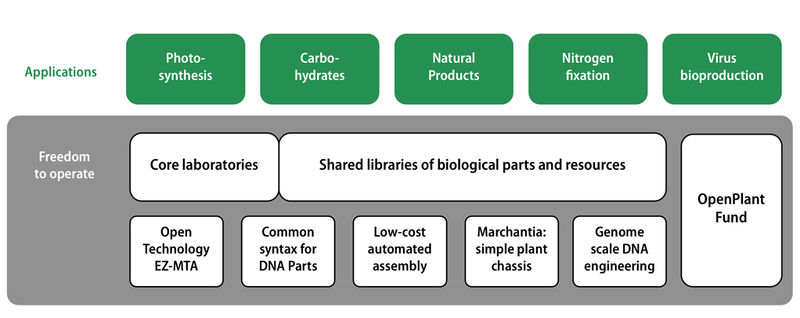OpenPlant

Synthetic Biology offers the prospect of reprogrammed biological systems for improved and sustainable bioproduction. While early efforts in the field have been directed at microbes, the engineering of plant systems provides even greater potential benefits. In contrast to microbes, plants are already globally cultivated at extremely low cost, harvested on the giga-tonne scale, and routinely used to produce the widest range of biostuffs, from fibres, wood, oils, sugar, fine chemicals, drugs to food. Plants are genetically facile, and GM plants are currently grown on the >100 million hectare scale. Plant systems are ripe for synthetic biology, and any improvement in the ability to reprogram metabolic pathways or plant architecture will have far-reaching consequences.
OpenPlant is a BBSRC / EPSRC Synthetic Biology Research Centre, supported by the Research Councils' Synthetic Biology for Growth programme. The initiative promotes interdisciplinary exchange, open technologies for innovation and responsible innovation for sustainable agriculture and conservation.
Examples of initiatives
- engineering of biological nitrogen fixation in cereal crops.
- exploring ways of modifying plant roots for improved nitrogen uptake,
- altering soil bacteria for beneficial crop associations and production of synthetic ecologies in agriculture.
- Similar possibilities exist for improving photosynthesis, phosphorus utilization, weed control, and bioproduction of new foods, materials, chemicals, pharmaceuticals, biopolymers and energy.
Comments (Rasmus)
- the focus on nitrogen fixation is very interesting
- What are the possibilities to interface these efforts with the various open source hardware initiatives (OSE, other)?
- very helpful would be projects about duckweed or azolla - plants that are easy to grow as part of an integrated agriculture system (project idea: production of omega-3 fatty acids or nitrogen fixation in duckweed).
Links
- OpenPlant Website | OpenPlant Blog | Twitter: https://twitter.com/@_OpenPlant
- Open Source Hardware Development Method | Open Source Ecology
